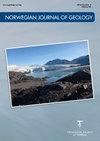挪威奥斯陆裂谷Larvik Plutonic杂岩的伟晶岩:野外关系和特征
IF 0.8
4区 地球科学
Q2 Earth and Planetary Sciences
引用次数: 3
摘要
拉维克深部杂岩(Larvik Plutonic Complex, LPC)含伟晶岩,具有广泛的矿物组合和形态特征。伟晶岩传统上被描述为霞石正长岩和正长伟晶岩,它们分别携带着榴辉岩或云母岩矿物组合。然而,一些伟晶岩不属于这种简单的特征,因为它们是“类似于agpatical”的晚期岩浆矿物组合,如辉石岩和双溶岩群矿物。伟晶岩之间的形态和矿物学差异并不是LPC特定区域所特有的,也不是与之相关的。寄主岩体的成分变化和变形特征是造成LPC伟晶岩形态和矿物组合差异的主要机制。钠辉石取代长石是霞石正长伟晶岩最常见的蚀变特征。蚀变的程度与糖体钠长石和铝镁石的结晶密切相关。对位于sag本文章由计算机程序翻译,如有差异,请以英文原文为准。
Pegmatites of the Larvik Plutonic Complex, Oslo Rift, Norway: field relations and characterisation
The Larvik Plutonic Complex (LPC) contains pegmatites with a wide array of mineral assemblages and morphological features. The pegmatites have traditionally been described as nepheline syenite and syenite pegmatites which carry agpaitic or miaskitic mineral assemblages, respectively. However, several pegmatites fall outside this simple characterisation due to ‘agpaitic-like’ late magmatic mineral assemblages such as hiortdahlite and eudialyte group minerals. Morphological and mineralogical differences between pegmatites are not unique to, or related with, specific areas of the LPC. Compositional variation and deformation features of the host pluton are the main mechanisms for differing morphology and mineral assemblages between LPC pegmatites. Natrolite replacement of feldspathoid is the most common alteration feature in the nepheline syenite pegmatites. The extent of alteration is closely associated with crystallisation of saccharoidal albite and aegirine. Detailed description of a nepheline syenite pegmatite situated in the Sagåsen quarry provides new insights into the internal evolution and mineral distribution of a large representative pegmatite body. The most important mechanism driving hydrous alteration is the crystallisation of anhydrous primary minerals which leads to an immiscible hydrous fluid driving in situ alterations of primary mineral assemblages.
求助全文
通过发布文献求助,成功后即可免费获取论文全文。
去求助
来源期刊

Norwegian Journal of Geology
地学-地球科学综合
CiteScore
1.60
自引率
25.00%
发文量
0
审稿时长
>12 weeks
期刊介绍:
The Norwegian Journal of Geology publishes high-quality, fully peer-review papers from all geoscientific disciplines. Papers are commonly based on regional studies and should emphasise the development of understanding of fundamental geological processes. More specialised papers can also be submitted, but should be written in a way that is easily understood by nonspecialists, and illustrate the progress being made within that specific topic in geosciences. We also encourage initiatives for thematic issues within the scope of the Journal.
 求助内容:
求助内容: 应助结果提醒方式:
应助结果提醒方式:


